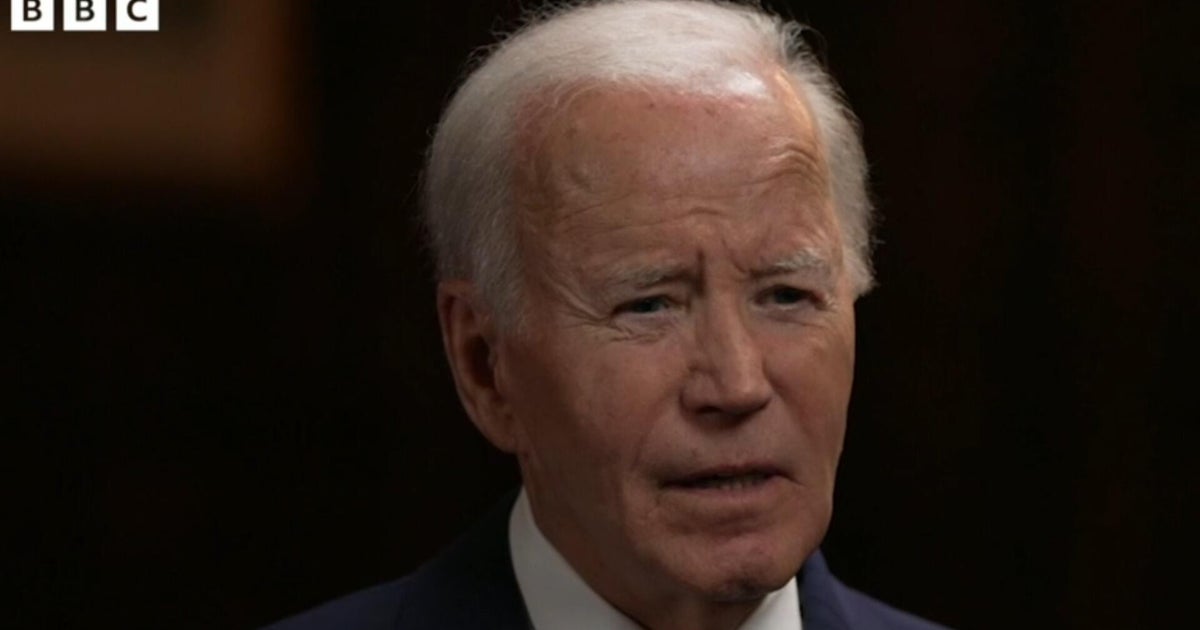
In former President Joe Biden‘s first interview since leaving office, he slammed President Trump’s foreign policy, describing Mr. Trump’s actions toward Russia as “modern-day appeasement” and saying “what the hell’s going on here?” about what he called Mr. Trump’s “confiscation” policy regarding Greenland, Canada, the Panama Canal and renaming the Gulf of Mexico.
“What the hell’s going on here? What president ever talks like that? That’s not who we are,” Biden told CBS News partner network BBC News. “We’re about freedom, democracy, opportunity, not about confiscation.”
Mr. Trump met Tuesday with Canadian Prime Minister Mark Carney, whose Liberal Party’s victory in the April elections appeared to be influenced by Mr. Trump’s stance. At Tuesday’s Oval Office meeting, Carney said Canada “won’t be for sale, ever,” while Mr. Trump mused, “never say never.”
Mr. Trump has taken to referring to Canada as the 51st state, although he said in an interview last week that “I don’t see” using military force in Canada.
But, he said in an interview with NBC News’ “Meet the Press” that “something could happen with Greenland, I’ll be honest,” adding that “we need that for national and international security.”
Even before Mr. Trump took office in January, he talked about acquiring the Panama Canal and Greenland, and he has ramped up his rhetoric on Greenland in recent weeks, declining to rule out military force. Greenland is a semi-autonomous state in the Kingdom of Denmark, although there is a U.S. military base, Mr. Trump’s comments have not been well received there.
Biden spoke to BBC News ahead of the 80th anniversary of V-E Day, or the day that the Nazis surrendered in Europe. While in office, Biden had pledged support to help Ukraine after the Russian invasion, even linking World War II and Ukraine.
But Mr. Trump has taken a different approach toward Russia in the conflict, and has blasted Ukrainian President Volodymyr Zelenskyy as being ungrateful while also signing a deal with Ukraine for minerals.
Biden called the Trump administration’s policy “modern-day appeasement” to Russian President Vladimir Putin.
“Listen to what Putin said when he talked about going from Kyiv into Ukraine, and why he can’t stand the fact that the Russian dictatorship that he runs, that the Soviet Union has collapsed, and anybody thinks he’s going to stop is this foolish,” Biden said.
Biden continued that he “found it sort of beneath America the way that took place,” as well as Mr. Trump’s actions renaming the Gulf of Mexico as the Gulf of America. Mr. Trump signed an executive order on his first day in office to rename the Gulf, and has since blocked Associated Press reporters from covering certain Oval Office events for refusing to comply with that order.
Mr. Trump has long been suspicious of the alliance with Europe formed after World War II, saying in March that the continent has been “very, very bad for us.”
Biden said forming NATO is “one of the smartest things we did,” and called it a “grave concern” that the alliance could be ending.
“I think it would change the modern history of the world that occurs,” Biden said. “Look, we are not the essential nation, but we’re the only nation in a position to have the capacity to bring people together, to lead the world, and otherwise you’re going to have China and the former Soviet Union, Russia stepping out.”
In response to Biden’s comments, White House spokesman Steven Cheung posted on social media that Biden is a “complete disgrace to this country and the office he occupied.”
Democrats have fumed and struggled to reorganize themselves after Mr. Trump’s victory, with much of the fury going toward Biden for staying in the 2024 race for too long. But Biden said Wednesday that he didn’t think it made a difference, adding that “we left at a time when we had a good candidate.”
“Things moved so quickly that it made it difficult to walk away to get and it was a, it was a hard decision,” Biden said.
But when asked if he had any regrets about dropping out of the race, Biden said it was the “right decision.”
Biden had largely stayed out of public view after Mr. Trump’s inauguration, although he spoke at a Chicago conference in April and attended Pope Francis’ funeral last week.
